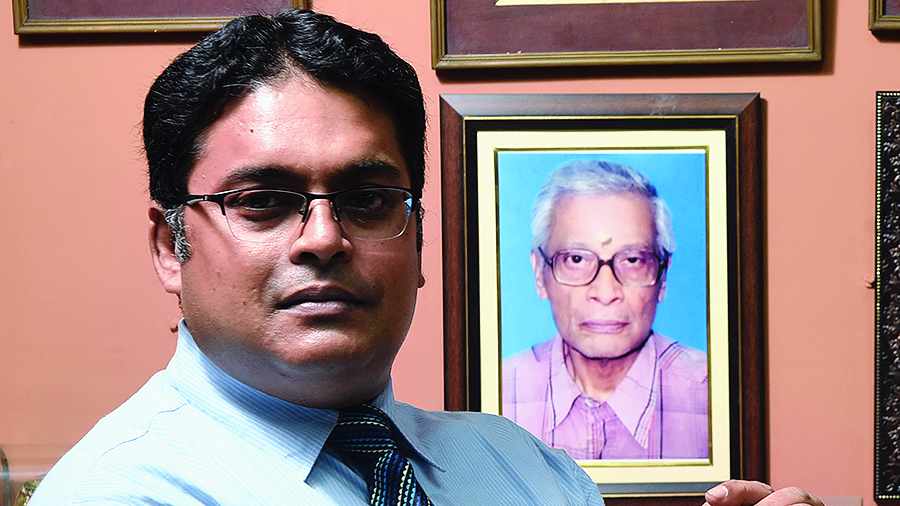As a child, Sudipto Saha did not feel any different from other children, except for one or two things. One of those was the mode of transport he used for school.
“I used to go to school in a mini truck,” he smiles. From KG to Class X, Sudipto went to St Paul’s in Kidderpore from his family home in Behala in southwest Kolkata in that truck, sitting next to the driver in the front seat. A cousin sat on the other side, who would be dropped to her school next.
This was all right in the junior classes, but as he grew older other boys began to comment on the unusual choice of vehicle. “Then I reasoned that the mini truck was a far more expensive and grander vehicle than a mere Ambassador,” laughs Sudipto, 45.
He is now the CEO of B.K. Saha and Brothers Limited, a pioneering Bengali trading tea company, which has turned hundred this year. This is his family business, though as a school-going child he would not be perfectly aware of his legacy, something that he is now proud of and trying to build on. The company was among the leading tea traders in Bengal till a few decades ago.
But as a child, Sudipto would get glimpses of the grandeur, too. June 1 was an occasion every year, he says, till the early Eighties. “June 1 was Halkhata,” he explains. Halkhata is the Bengali word for the new accounts book that usually a business or shop opens on Poila Baisakh, the Bengali new year, but for certain tea companies here June 1 marked the beginning of the business year as that day opened the new tea season. “Then plucking would start mid-April. By end-May, the new tea would have arrived ready for distribution.”
Now that winters are shorter, plucking starts end-February, Sudipto says.
B.K. Saha and Brothers still celebrates June 1, but in its heyday, when its main office was located at the 5,000 sq ft premises at 5, Pollock Street in Dalhousie area, about a thousand guests would be invited at that address for a meal of luchi, alur dom, ghughni and four kinds of mishti, throughout the day. “Guests, our clients, would arrive even from Odisha, with their family. Each variety of sweet would be made in 2,000 pieces at our Behala home from the previous night. But the high point for us cousins, who were all growing up together at the family home, would be unlimited ice cream.”
At a time when one small cup of ice cream could have been precious, being allowed endless ice cream was a fantasy. As a child, Sudipto would also be intrigued by a separate enclosure on the occasion, where the best Scotch would be served to special guests.
Some of the grandeur is still evident at the new office of B.K. Brothers at 2, Brabourne Road, where the company moved into in 1999.
This is the only space B.K. Brothers operates from now, with its retails outlets, including the famous Lalbazar one, having shut down. The new office, on the first floor of an old building, is spacious as well, and an interesting, sometimes starling mix of the old and the new, in almost everything.
It is so in the furniture, with sunmica topping old, heavy wood, in its doors, with an old, stubborn solid wooden door offering a contrast to a new shiny plywood one, in its old-fashioned tea cups standing against newly-branded packets of tea. And Sudipto, whose job profile as CEO was created only very recently in a concern that till then only had directors and managers, sits in a room where the walls are adorned by photographs of his ancestors, and his eyes are fixed on the future.
In the late nineteenth century his great-grandfather, who was known as “zamindar” Kalinath Saha, owned a lot of land in Kushtia in the then-undivided Bengal, in Kachhar, now in Assam and in the Dooars in north Bengal.
He also owned four tea estates in Kachhar and north Bengal. His son Basanta Kumar Saha, along with his brothers, started the tea business that bears his name and the earliest official mention of which goes back to 1922.
They were into both wholesale and retail. Their retail outlet at 2, Lalbazar Street — there were several retail outlets in the city — was a landmark. Their solid, emphatic but neatly-designed logos, including their Elephant Brand Orange Pekoe tea (the label says 1/4 pound, as tea weight did not transition to metric system for long) stood out and were a familiar part many homes, like the A. Tosh brand. B.K. Brothers originally sold Darjeeling tea and Assam tea, as whole leaf and fannings. The “dust” tea was sold as “Hotel Brand”.
After the CTC (Cut, Tear, Curl) tea was introduced in the Sixties, it became an important item on their list.
About 80% of the tea was bought from auctions, the remaining privately or directly from the estates. Business was good. B.K. Saha was an example of a successful Bengali enterprise. Sudipto’s father and his uncles were running the show after the initial decades.
“The Lalbazar retail outlet was so successful that in the Sixties or Seventies it could earn up to Rs 1 lakh in cash,” says Sudipto, who is still a Behala resident, living with other family members in a new building constructed on the family plot.
“On the centenary year, people in their Seventies or so are writing to us to talk about their visits to our store.”
The good times continued till the late Seventies or early Eighties. Due to several factors, including tea estate conditions, a changing market, intense competition and a few other compulsions, such as Metro rail construction that required buildings to be demolished, took their toll on B.K. Saha, especially on its retail business. The outlets began to close down one by one.
Sudipto joined the family business in the late Nineties after graduating in commerce, following which he was studying Chartered Accountancy. Around the time he joined, the company had moved to its current address and had shut down all its retail outlets. Sudipto was then, in addition, part of the Amway network, where he did very well and learned a lot.
Changes kept happening in the tea world, as elsewhere. “The processes remained the same,” says Sudipto. But the setting changed, as did the ethos. For example, e-auctions replaced the on-ground events, which Sudipto mourns. He misses the dress code, the politeness, the elegance and sophistication of that world, and the meeting with personalities. His uncle, who was a regular at the auctions, attended the last auction for Darjeeling tea in 2016 at the J. Thomas building, and the occasion was almost tragic, feels Sudipto. B.K. Saha now acquires about 60% of its tea from auctions.
“In the last 10 years we began to feel the need for a turnaround in our business,” says Sudipto. He was willing to take the responsibility of creating this change and gradually took on the leader’s role. The company has family members on its board, but created the role of CEO to introduce a corporate structure and have a face to represents the company on other platforms, which is becoming a necessity increasingly.
Sudipto is trying to meet the demands of now. For which, with some sweet irony, he is going back to the past: to retail. He has already started the work: small standee zipper packs wait on the tables and counters at the office, of Darjeeling, Assam or CTC tea, and green tea, of course, with new artwork. These will be available at some stores now across Bengal, but eventually he hopes to place them on giant retail chains in the country for maximum reach. The scope is immense. “India is a country of 1.5 billion people. So many of them drink tea.”
Eventually, he says, he will go global, placing his tea on online global networks. That way, some of the glory will come back to B.K. Saha. Maybe a little more than that.
Change can be good too. In any case it is constant. Sudipto points out that tea chests, such a symbol of the tea trade, began to vanish two decades ago and were replaced by jute bags and finally, paper bags.






